牛津深圳版英语八年级上Grammar时间&条件状语从句复习课件(27张PPT)
文档属性
| 名称 | 牛津深圳版英语八年级上Grammar时间&条件状语从句复习课件(27张PPT) | 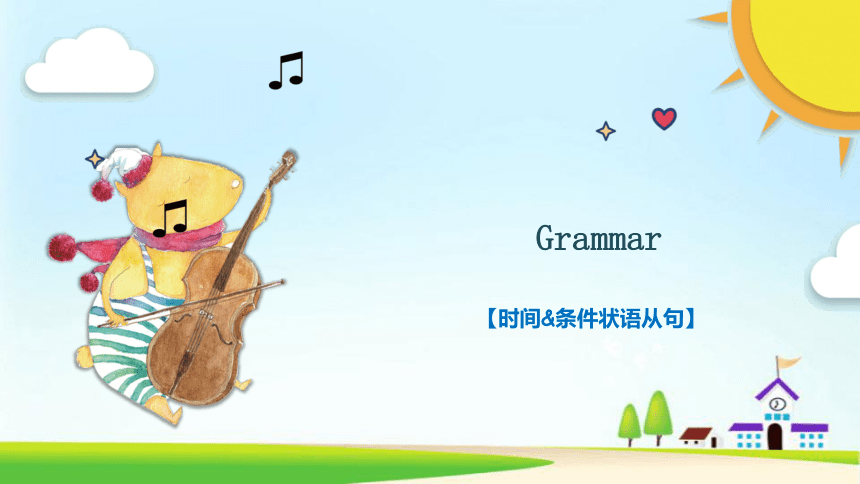 | |
| 格式 | zip | ||
| 文件大小 | 6.1MB | ||
| 资源类型 | 教案 | ||
| 版本资源 | 牛津深圳版 | ||
| 科目 | 英语 | ||
| 更新时间 | 2022-01-24 22:13:12 | ||
图片预览

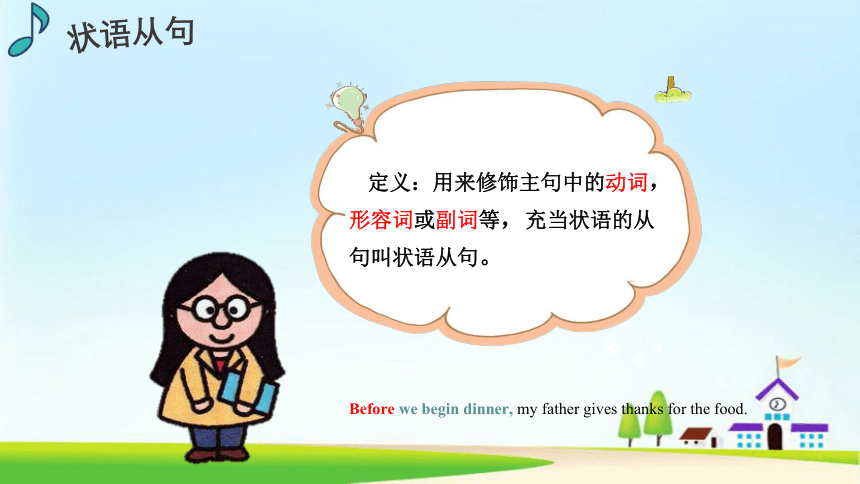
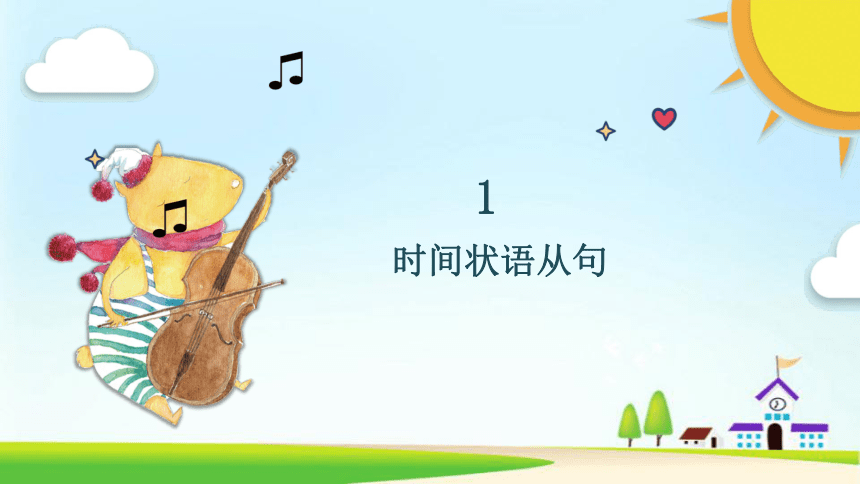
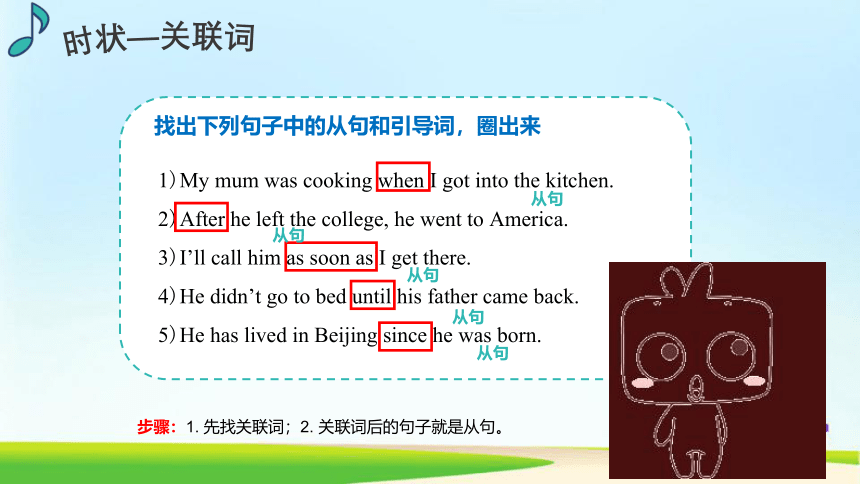
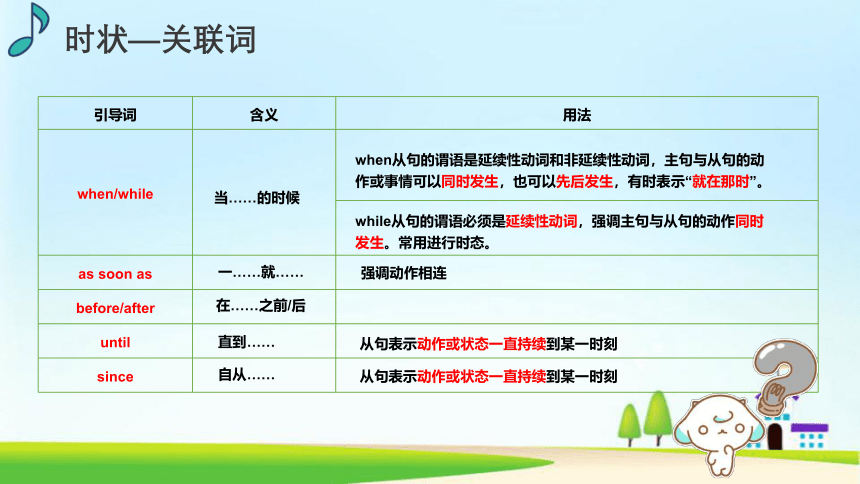
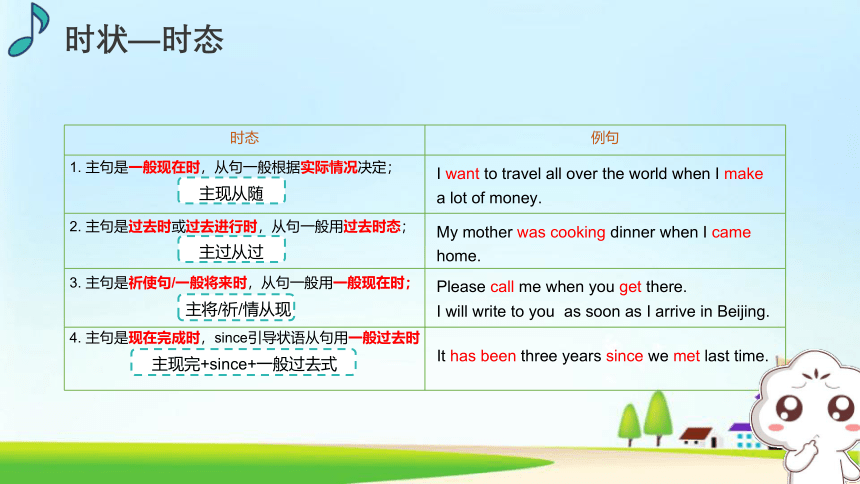
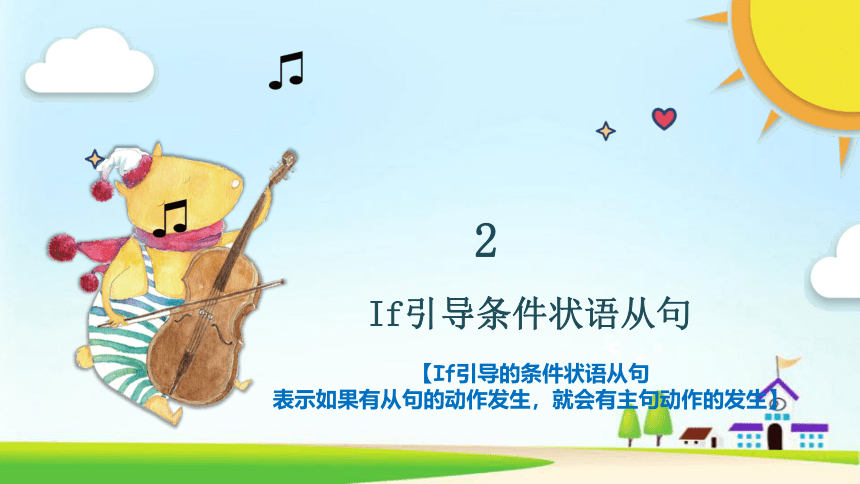
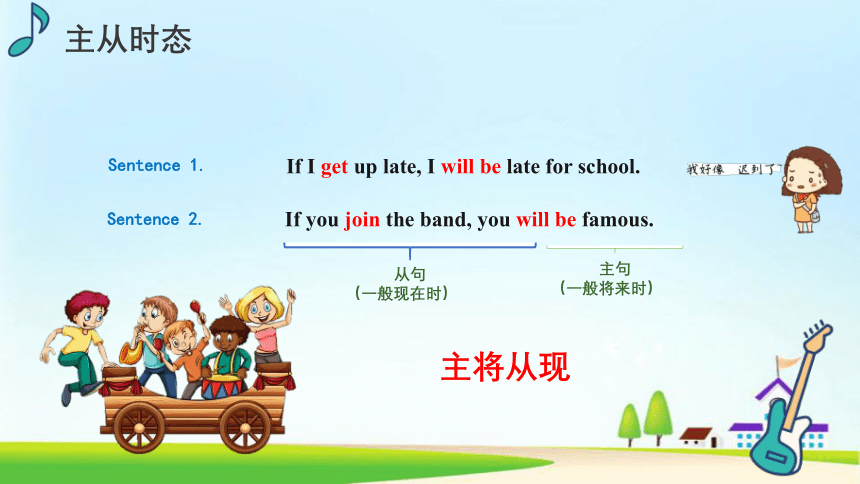
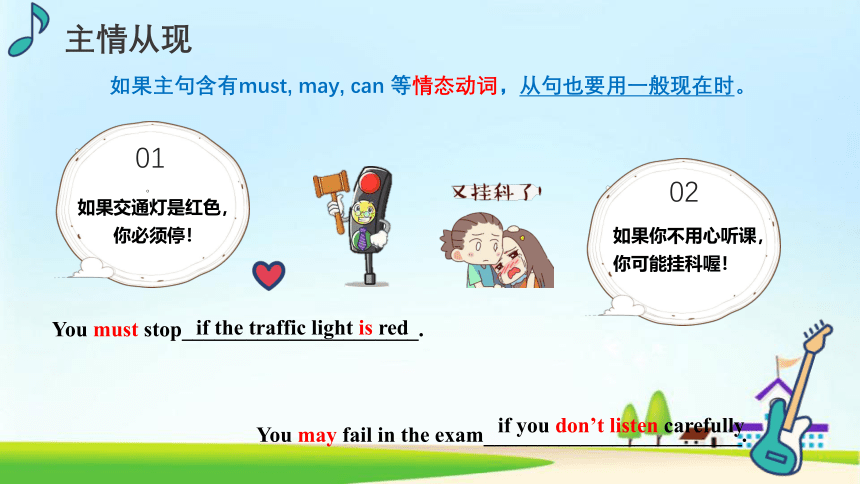
文档简介
(共27张PPT)
Grammar
【时间&条件状语从句】
状语从句
定义:用来修饰主句中的动词,形容词或副词等,充当状语的从句叫状语从句。
Before we begin dinner, my father gives thanks for the food.
1
时间状语从句
时状—关联词
找出下列句子中的从句和引导词,圈出来
1)My mum was cooking when I got into the kitchen.
2)After he left the college, he went to America.
3)I’ll call him as soon as I get there.
4)He didn’t go to bed until his father came back.
5)He has lived in Beijing since he was born.
步骤:1. 先找关联词;2. 关联词后的句子就是从句。
从句
从句
从句
从句
从句
时状—关联词
引导词 含义 用法
when/while
as soon as
before/after
until
since
当……的时候
一……就……
在……之前/后
直到……
自从……
when从句的谓语是延续性动词和非延续性动词,主句与从句的动作或事情可以同时发生,也可以先后发生,有时表示“就在那时”。
while从句的谓语必须是延续性动词,强调主句与从句的动作同时发生。常用进行时态。
强调动作相连
从句表示动作或状态一直持续到某一时刻
从句表示动作或状态一直持续到某一时刻
时状—时态
时态 例句
I want to travel all over the world when I make a lot of money.
主现从随
主过从过
主将/祈/情从现
主现完+since+一般过去式
My mother was cooking dinner when I came home.
Please call me when you get there.
I will write to you as soon as I arrive in Beijing.
It has been three years since we met last time.
1. 主句是一般现在时,从句一般根据实际情况决定;
2. 主句是过去时或过去进行时,从句一般用过去时态;
3. 主句是祈使句/一般将来时,从句一般用一般现在时;
4. 主句是现在完成时,since引导状语从句用一般过去时
2
If引导条件状语从句
【If引导的条件状语从句
表示如果有从句的动作发生,就会有主句动作的发生】
主从时态
If you join the band, you will be famous.
Sentence 2.
If I get up late, I will be late for school.
Sentence 1.
主句
(一般将来时)
从句
(一般现在时)
主将从现
主情从现
01
。
02
如果主句含有must, may, can 等情态动词,从句也要用一般现在时。
You must stop______________________.
如果交通灯是红色,你必须停!
如果你不用心听课,你可能挂科喔!
if the traffic light is red
if you don’t listen carefully
You may fail in the exam________________________.
主祈从现
如果主句是祈使句,从句同样要用一般现在时。
如果山太高,不要爬!
Don’t climb it_________________________.
如果你有任何英语问题,请告诉我!
Please tell me_____________________________.
if the mountain is very high!
if you have any English question!
主现从现
特殊情况:表示科学常识、事实、 经常性的动作或倾向自动会发生的事。
If water is heated,_______________.
______________________________
if it rains.
it turns to steam
People often take an umbrella on Sundays
句型互换
◎ 1. If 条件状语从句,可转化为“祈使句,or (不好结果句子)”,“祈使句,and(好的结果句子)”。
If you study hard, you will win the first prize.
=Study hard, or you won’t win the first prize.
=Study hard, and you will win the first prize.
◎ 2. If 条件状语从句,可转化为介词with, without的短语
If you help us, we will finish the work on time.
=We will finish the work on time with your help.
一般将来时
3
unless引导的条件状语从句
unless引导的条件状语从句,表示“如果不,除非”
unless的条状从句
unless“除非,如果不”,表示否定意义(if…not)
主句可以是一般将来时、祈使句或含有情态动词的句子,从句多用一般现在时表将来。
You will never get anywhere unless you have set your goal.
如果你不设定目标,你哪儿也到不了。
You will never get anywhere if you don’t have set your goal.
Don’t touch the computer unless the teacher allows you.
没有老师的允许,不要碰电脑。
4
状语从句练习
Have a try
Ⅰ. 用when和while填空
1. He was listening to music _______________ he was riding his bike.
2. I was waiting at the lights _______________ I saw the boy fall off his bike.
3. I was walking in the street _______________ an accident happened.
4. The driver was talking on his mobile phone _______________ he was driving.
5. I was trying to pick it up _______________ it bit me again.
Ⅱ. 在正确的答案下划线
1. I(will call/call)you if he(will stay/stay/stays)at home.
2. Unless it(will/does/are/is)rainy, we(will take/take/takes)a walk outside.
3. If you(don’t/doesn’t/isn’t/won’t)put fish back to water, it(die/will die/died).
4. Daina(will go/go/goes)to Europe if she(will pass/pass/passes)the exams.
5. If there(will be/are/is)a car accident, they(will call/call/calls)110 for help at once.
6. If a UFO(will land/land/lands)in front of me, I(will go/go/goes)in to look for the alien.
7. If he(will have/have/has)money, he(will build/build/builds)a science lab.
8. Don’t wait for me if I(am/will be)late.
9. They(won’t/don’t)go to the beach if it(will rain/rain/rains).
10.(Will/Do/Does)he visit the museum if he(won’t/don’t/doesn’t)get tired
while
when
when
while
when
Ⅲ. 单项选择
( )1. She is going to report to us as soon as she ________.
A. will arrive B. arrives C. is arriving D. is going to arrive
( )2. Mr Black won’t come back ________ you give him a call.
A. when B. that C. unless D. while
( )3. We’ll go to the Great Wall if it ________ tomorrow.
A. to rain B. doesn’t rain C. rain D. rains
( )4. ________ you are young, you must work hard.
A. After B. Before C. While D. As soon as
( )5. The twin brothers have learned a lot ________ they came to Beijing.
A. when B. as soon as C. since D. after
( )6. I will call you as soon as I ________ the ticket to the football match.
A. will get B. get C. got D. am getting
( )7. ________ me back my money, or I’ll ring the police.
A. Giving B. Given C. Give D. To give
( )8. I hope you’ll come to see us ________ you have time.
A. before B. after C. or D. when
B
C
B
C
C
B
C
D
( )9. You’ll be late for school ________ you don’t hurry.
A. or B. if C. whether D. unless
( )10. I won’t get to the party on time ________ I catch the first train tomorrow morning.
A. if B. unless C. whether D. when
( )11. ________ he was doing his homework, the telephone rang.
A. Because B. If C. While D. Since
( )12. You should finish your lessons ________ you go out to play.
A. before B. after C. when D. while
( )13. Study hard, ________ you can catch up with others.
A. so B. or C. and D. /
( )14. She is sure to pass the examination ________ she is ill.
A. or B. if C. whether D. unless
( )15. I ________ her the answer if she ________ me.
A. can tell; will ask B. will tell; will ask
C. would tell; ask D. will tell; asks
B
B
C
A
C
D
D
04
Practice
练习
完型填空
Welcome to London, the capital city of the UK. There are lots of famous landmarks(地标)in London.
Some famous landmarks to 1 are the royal palaces(室宫殿)and parks. Buckingham Palace(白金汉官)is 2 of the royal family in London. So it is the first stop for visitors. The kings and queens of Great Britain have lived there 3 Queen Victoria in the 1830s.
Do you know Trafalgar Square(特拉法加广场) It is close to Buckingham Palace. There are many pigeons(鸽子)at the square, 4 people call it the Pigeon Square.
From Trafalgar Square you can see 5 famous landmark—Big Ben. This is a famous landmark and 6 tourists visit it and take photos here.
A great way to see London is by 7 a trip on one of London’s newest landmarks, London Eye. This is a big 8 on the banks of the River Thames. Hundreds of visitors take a “flight” on London Eye every day.
In all, there are lots of 9 landmarks in London. Come and see for yourself. You will
10 that London is a really good place for sightseeing.
( )1. A. look B. watch C. see
( )2. A. home B. family C. park
( )3. A. at B. during C. since
( )4. A. but B. although C. so
( )5. A. other B. others C. another
( )6. A. much B. many C. few
( )7. A. playing B. setting C. taking
( )8. A. bus B. wheel C. clock
( )9. A. unpopular B. popular C. new
( )10. A. put out B. get out C. find out
CACCCBCBBC
Peter could not sleep well and he woke up several times during the night, so he went to see a doctor. His doctor gave him some sleeping tips.
★Have regular sleep
Wake up at the same time and go to bed at the same time every night. This can make your sleep a bit better.
★Turn off the TV
Don’t watch television for more than half an hour before you decided to sleep. Studies show that it is bad for the quality of your sleep. Read a book or listen to some light music to prepare your body for sleeping.
★Have a clean and comfortable bedroom
A clean environment helps people to be happy and relaxed. Make sure that you have turned off all light that might come into your room.
★Do some exercise
Exercising will help you to fall asleep more easily, so work out for 20 minutes every day and you will sleep better at night. But don’t do it just before you go to bed—you won’t be able to sleep!
( )1. Why did Peter go to see a doctor
A. Because he had some trouble sleeping well. B. Because he couldn’t get up early.
C. Because there’s something wrong with his head. D. Because he often got angry easily.
( )2. The doctor asked Peter to ________.
A. go to bed with the light on B. get up later on Sunday mornings
C. never do any exercise and have a good rest D. have a clean and comfortable bedroom
( )3. The underlined word “environment” means “________” in Chinese.
A. 家庭 B. 环境 C. 地点 D. 场所
( )4. According to the passage, we’d better not do exercise ________.
A. after dinner B. at night C. before going to bed D. before dinner
( )5. Which of the following is NOT TRUE according to the passage
A. The doctor gave Peter some sleeping tips. B. Four tips are mentioned in the passage.
C. The doctor said watching television for an hour is good for sleeping. D. We can listen to some light music to prepare for sleeping.
A
D
B
C
C
Every day, it is easy to see advertisements(广告)in English all around us. Look at your own bags and clothes, and at the bags and clothes of your classmates. How many different advertisements can you see which use English words
Often bags and clothes show the name of the company that made them. This is a popular form. A special picture or symbol called a logo is sometimes used. Logos appear on many different products(产品). They are popular because when you see a logo, it is hard to forget that product or company. It is common to see advertisements on TV and hear them on the radio. Most advertisements are very short. Sometimes the advertisers use a short sentence which is easy for people to say and remember. Nike, for example, has a simple English sentence which is used all around the world: “Just do it.” Advertisements often use funny situations as well. It is simple to remember it.
All advertisements are designed(设计)to make people buy a product. An advertisement for a soft drink, for example, might show a group of young people who are having fun. The young people are drinking the soft drink. Advertisers are saying to you, “Why don’t you buy this drink and be like these people You can be young and modern”.
You might think that advertisements are not after you, but the next time you buy a soft drink, ask yourself this question: Why am I buying this particular(特别的)product
( )1. From the passage, we know that ________.
A. all the advertisements around us are written in English B. many bags have the name of the company that made them
C. having soft drinks makes a person young and modern D. advertisements are only after young people
( )2. A good logo is ________.
A. easy to remember B. a useful product C. difficult to understand D. easy to buy
( )3. People are most likely to remember an advertisement that is ________.
A. in English B. long C. funny D. famous
( )4. All advertisements are designed to ________.
A. sell you something you don’t want B. make you young and modern C. make you buy the produce D. show you what you need to buy
( )5. The best title of this passage may be ________.
A. Advertisements for Bags and Clothes B. Advertisements on TV and Radio C. Advertisements About Sports D. Advertisements Around Us
B
A
C
C
D
语法填空
Now a group of British students from Woodpark School in London 1. ____________(visit) Xinhua Junior High School in Beijing on an 2. ____________(education)exchange(交流).
Sarah says she was very nervous at first but her host family are 3. ____________(real) friendly. She is glad to be a guest in their home and has learnt 4. ____________(use) chopsticks. Besides, she is being taught to speak Chinese. The students spend the weekdays 5. ____________(study)with Chinese students. At the weekend, they travel around Beijing and visit places of interest 6. ____________ their host families. Eric says it 7. ____________(be) a fantastic experience so far. In addition, he has learnt a little t'ai chi as well as a lot about Chinese culture and history. The teachers have introduced Chinese painting to them too. Sarah says she has made many new friends and will keep in touch with 8. ____________(they)when she goes back to the UK.
9. ____________(final), she can’t wait to see her Chinese friends soon because they will come over to Britain for the 10. ____________(two)part of the exchange next month.
are visiting
educational
really
to use
studying
with
has been
them
Finally
second
5
Culture
文化
Wall Street Bull
The Wall Street Bull, which is also referred to as Charging Bull or the Bowling Green Bull, is a 3200-kilogram bronze sculpture by Arturo Di Modica that stands in Bowling Green Park near Wall Street in Manhattan, New York City. Standing 11 feet(3.4m)tall and measuring 16 feet(4.9m)long, the oversize sculpture depicts a bull, the symbol of aggressive financial optimism and prosperity, leaning back on its haunches and with its head lowered as if ready to charge.
The sculpture is both a popular tourist destination which draws thousands of people a day, as well as “one of the most iconic images of New York” and a “Wall Street icon” symbolizing “Wall Street” and the Financial District.
华尔街铜牛
华尔街铜牛也被称为金融牛或者博林格林牛,这是一座重达3200公斤的铜塑雕像,设计者是阿图罗 迪 莫迪卡。这头牛坐落于纽约市曼哈顿华尔街附近的博林格林公园,11英尺(3.4米)高,16英尺(4.9米)长。这大型雕像的造型为一头牛,腰部后倾,脑袋低垂,似乎准备发起进攻,而这象征着财政繁荣,股市大涨。
现在,这座雕像是著名的旅游目的地,每天吸引着成千上万的游客,同时也是纽约的代表和华尔街的标志形象,象征着整个华尔街和金融区。
铜牛诞生背景
1989年10月13日星期五下午收市前一个小时,道 琼斯工业股票平均价格突然开始迅速下跌,抛售的指令蜂拥而至,以致不能按时收市。收市时,华尔街股票总市值在半小时内跌掉了约2500亿美元,被世人称为“黑色星期五”。由于这种跌势类似两年前的“黑色星期一”,因而世界各地的股票市场顿时陷入惶惶不安之中,唯恐“黑色星期一”再次降临。
在1987年纽约股市崩盘之后,阿图罗 迪 莫迪卡有了创作的灵感。他说:“当我看到有人失去了一切,我感到非常难过,于是我开始为年轻的美国人创作一件美丽的艺术品。”为了筹资,他卖掉了家乡西西里祖传农场的一部分,总共筹得资金36万美元,最终完成了雕塑。
Thank you!
谢谢观看!
Grammar
【时间&条件状语从句】
状语从句
定义:用来修饰主句中的动词,形容词或副词等,充当状语的从句叫状语从句。
Before we begin dinner, my father gives thanks for the food.
1
时间状语从句
时状—关联词
找出下列句子中的从句和引导词,圈出来
1)My mum was cooking when I got into the kitchen.
2)After he left the college, he went to America.
3)I’ll call him as soon as I get there.
4)He didn’t go to bed until his father came back.
5)He has lived in Beijing since he was born.
步骤:1. 先找关联词;2. 关联词后的句子就是从句。
从句
从句
从句
从句
从句
时状—关联词
引导词 含义 用法
when/while
as soon as
before/after
until
since
当……的时候
一……就……
在……之前/后
直到……
自从……
when从句的谓语是延续性动词和非延续性动词,主句与从句的动作或事情可以同时发生,也可以先后发生,有时表示“就在那时”。
while从句的谓语必须是延续性动词,强调主句与从句的动作同时发生。常用进行时态。
强调动作相连
从句表示动作或状态一直持续到某一时刻
从句表示动作或状态一直持续到某一时刻
时状—时态
时态 例句
I want to travel all over the world when I make a lot of money.
主现从随
主过从过
主将/祈/情从现
主现完+since+一般过去式
My mother was cooking dinner when I came home.
Please call me when you get there.
I will write to you as soon as I arrive in Beijing.
It has been three years since we met last time.
1. 主句是一般现在时,从句一般根据实际情况决定;
2. 主句是过去时或过去进行时,从句一般用过去时态;
3. 主句是祈使句/一般将来时,从句一般用一般现在时;
4. 主句是现在完成时,since引导状语从句用一般过去时
2
If引导条件状语从句
【If引导的条件状语从句
表示如果有从句的动作发生,就会有主句动作的发生】
主从时态
If you join the band, you will be famous.
Sentence 2.
If I get up late, I will be late for school.
Sentence 1.
主句
(一般将来时)
从句
(一般现在时)
主将从现
主情从现
01
。
02
如果主句含有must, may, can 等情态动词,从句也要用一般现在时。
You must stop______________________.
如果交通灯是红色,你必须停!
如果你不用心听课,你可能挂科喔!
if the traffic light is red
if you don’t listen carefully
You may fail in the exam________________________.
主祈从现
如果主句是祈使句,从句同样要用一般现在时。
如果山太高,不要爬!
Don’t climb it_________________________.
如果你有任何英语问题,请告诉我!
Please tell me_____________________________.
if the mountain is very high!
if you have any English question!
主现从现
特殊情况:表示科学常识、事实、 经常性的动作或倾向自动会发生的事。
If water is heated,_______________.
______________________________
if it rains.
it turns to steam
People often take an umbrella on Sundays
句型互换
◎ 1. If 条件状语从句,可转化为“祈使句,or (不好结果句子)”,“祈使句,and(好的结果句子)”。
If you study hard, you will win the first prize.
=Study hard, or you won’t win the first prize.
=Study hard, and you will win the first prize.
◎ 2. If 条件状语从句,可转化为介词with, without的短语
If you help us, we will finish the work on time.
=We will finish the work on time with your help.
一般将来时
3
unless引导的条件状语从句
unless引导的条件状语从句,表示“如果不,除非”
unless的条状从句
unless“除非,如果不”,表示否定意义(if…not)
主句可以是一般将来时、祈使句或含有情态动词的句子,从句多用一般现在时表将来。
You will never get anywhere unless you have set your goal.
如果你不设定目标,你哪儿也到不了。
You will never get anywhere if you don’t have set your goal.
Don’t touch the computer unless the teacher allows you.
没有老师的允许,不要碰电脑。
4
状语从句练习
Have a try
Ⅰ. 用when和while填空
1. He was listening to music _______________ he was riding his bike.
2. I was waiting at the lights _______________ I saw the boy fall off his bike.
3. I was walking in the street _______________ an accident happened.
4. The driver was talking on his mobile phone _______________ he was driving.
5. I was trying to pick it up _______________ it bit me again.
Ⅱ. 在正确的答案下划线
1. I(will call/call)you if he(will stay/stay/stays)at home.
2. Unless it(will/does/are/is)rainy, we(will take/take/takes)a walk outside.
3. If you(don’t/doesn’t/isn’t/won’t)put fish back to water, it(die/will die/died).
4. Daina(will go/go/goes)to Europe if she(will pass/pass/passes)the exams.
5. If there(will be/are/is)a car accident, they(will call/call/calls)110 for help at once.
6. If a UFO(will land/land/lands)in front of me, I(will go/go/goes)in to look for the alien.
7. If he(will have/have/has)money, he(will build/build/builds)a science lab.
8. Don’t wait for me if I(am/will be)late.
9. They(won’t/don’t)go to the beach if it(will rain/rain/rains).
10.(Will/Do/Does)he visit the museum if he(won’t/don’t/doesn’t)get tired
while
when
when
while
when
Ⅲ. 单项选择
( )1. She is going to report to us as soon as she ________.
A. will arrive B. arrives C. is arriving D. is going to arrive
( )2. Mr Black won’t come back ________ you give him a call.
A. when B. that C. unless D. while
( )3. We’ll go to the Great Wall if it ________ tomorrow.
A. to rain B. doesn’t rain C. rain D. rains
( )4. ________ you are young, you must work hard.
A. After B. Before C. While D. As soon as
( )5. The twin brothers have learned a lot ________ they came to Beijing.
A. when B. as soon as C. since D. after
( )6. I will call you as soon as I ________ the ticket to the football match.
A. will get B. get C. got D. am getting
( )7. ________ me back my money, or I’ll ring the police.
A. Giving B. Given C. Give D. To give
( )8. I hope you’ll come to see us ________ you have time.
A. before B. after C. or D. when
B
C
B
C
C
B
C
D
( )9. You’ll be late for school ________ you don’t hurry.
A. or B. if C. whether D. unless
( )10. I won’t get to the party on time ________ I catch the first train tomorrow morning.
A. if B. unless C. whether D. when
( )11. ________ he was doing his homework, the telephone rang.
A. Because B. If C. While D. Since
( )12. You should finish your lessons ________ you go out to play.
A. before B. after C. when D. while
( )13. Study hard, ________ you can catch up with others.
A. so B. or C. and D. /
( )14. She is sure to pass the examination ________ she is ill.
A. or B. if C. whether D. unless
( )15. I ________ her the answer if she ________ me.
A. can tell; will ask B. will tell; will ask
C. would tell; ask D. will tell; asks
B
B
C
A
C
D
D
04
Practice
练习
完型填空
Welcome to London, the capital city of the UK. There are lots of famous landmarks(地标)in London.
Some famous landmarks to 1 are the royal palaces(室宫殿)and parks. Buckingham Palace(白金汉官)is 2 of the royal family in London. So it is the first stop for visitors. The kings and queens of Great Britain have lived there 3 Queen Victoria in the 1830s.
Do you know Trafalgar Square(特拉法加广场) It is close to Buckingham Palace. There are many pigeons(鸽子)at the square, 4 people call it the Pigeon Square.
From Trafalgar Square you can see 5 famous landmark—Big Ben. This is a famous landmark and 6 tourists visit it and take photos here.
A great way to see London is by 7 a trip on one of London’s newest landmarks, London Eye. This is a big 8 on the banks of the River Thames. Hundreds of visitors take a “flight” on London Eye every day.
In all, there are lots of 9 landmarks in London. Come and see for yourself. You will
10 that London is a really good place for sightseeing.
( )1. A. look B. watch C. see
( )2. A. home B. family C. park
( )3. A. at B. during C. since
( )4. A. but B. although C. so
( )5. A. other B. others C. another
( )6. A. much B. many C. few
( )7. A. playing B. setting C. taking
( )8. A. bus B. wheel C. clock
( )9. A. unpopular B. popular C. new
( )10. A. put out B. get out C. find out
CACCCBCBBC
Peter could not sleep well and he woke up several times during the night, so he went to see a doctor. His doctor gave him some sleeping tips.
★Have regular sleep
Wake up at the same time and go to bed at the same time every night. This can make your sleep a bit better.
★Turn off the TV
Don’t watch television for more than half an hour before you decided to sleep. Studies show that it is bad for the quality of your sleep. Read a book or listen to some light music to prepare your body for sleeping.
★Have a clean and comfortable bedroom
A clean environment helps people to be happy and relaxed. Make sure that you have turned off all light that might come into your room.
★Do some exercise
Exercising will help you to fall asleep more easily, so work out for 20 minutes every day and you will sleep better at night. But don’t do it just before you go to bed—you won’t be able to sleep!
( )1. Why did Peter go to see a doctor
A. Because he had some trouble sleeping well. B. Because he couldn’t get up early.
C. Because there’s something wrong with his head. D. Because he often got angry easily.
( )2. The doctor asked Peter to ________.
A. go to bed with the light on B. get up later on Sunday mornings
C. never do any exercise and have a good rest D. have a clean and comfortable bedroom
( )3. The underlined word “environment” means “________” in Chinese.
A. 家庭 B. 环境 C. 地点 D. 场所
( )4. According to the passage, we’d better not do exercise ________.
A. after dinner B. at night C. before going to bed D. before dinner
( )5. Which of the following is NOT TRUE according to the passage
A. The doctor gave Peter some sleeping tips. B. Four tips are mentioned in the passage.
C. The doctor said watching television for an hour is good for sleeping. D. We can listen to some light music to prepare for sleeping.
A
D
B
C
C
Every day, it is easy to see advertisements(广告)in English all around us. Look at your own bags and clothes, and at the bags and clothes of your classmates. How many different advertisements can you see which use English words
Often bags and clothes show the name of the company that made them. This is a popular form. A special picture or symbol called a logo is sometimes used. Logos appear on many different products(产品). They are popular because when you see a logo, it is hard to forget that product or company. It is common to see advertisements on TV and hear them on the radio. Most advertisements are very short. Sometimes the advertisers use a short sentence which is easy for people to say and remember. Nike, for example, has a simple English sentence which is used all around the world: “Just do it.” Advertisements often use funny situations as well. It is simple to remember it.
All advertisements are designed(设计)to make people buy a product. An advertisement for a soft drink, for example, might show a group of young people who are having fun. The young people are drinking the soft drink. Advertisers are saying to you, “Why don’t you buy this drink and be like these people You can be young and modern”.
You might think that advertisements are not after you, but the next time you buy a soft drink, ask yourself this question: Why am I buying this particular(特别的)product
( )1. From the passage, we know that ________.
A. all the advertisements around us are written in English B. many bags have the name of the company that made them
C. having soft drinks makes a person young and modern D. advertisements are only after young people
( )2. A good logo is ________.
A. easy to remember B. a useful product C. difficult to understand D. easy to buy
( )3. People are most likely to remember an advertisement that is ________.
A. in English B. long C. funny D. famous
( )4. All advertisements are designed to ________.
A. sell you something you don’t want B. make you young and modern C. make you buy the produce D. show you what you need to buy
( )5. The best title of this passage may be ________.
A. Advertisements for Bags and Clothes B. Advertisements on TV and Radio C. Advertisements About Sports D. Advertisements Around Us
B
A
C
C
D
语法填空
Now a group of British students from Woodpark School in London 1. ____________(visit) Xinhua Junior High School in Beijing on an 2. ____________(education)exchange(交流).
Sarah says she was very nervous at first but her host family are 3. ____________(real) friendly. She is glad to be a guest in their home and has learnt 4. ____________(use) chopsticks. Besides, she is being taught to speak Chinese. The students spend the weekdays 5. ____________(study)with Chinese students. At the weekend, they travel around Beijing and visit places of interest 6. ____________ their host families. Eric says it 7. ____________(be) a fantastic experience so far. In addition, he has learnt a little t'ai chi as well as a lot about Chinese culture and history. The teachers have introduced Chinese painting to them too. Sarah says she has made many new friends and will keep in touch with 8. ____________(they)when she goes back to the UK.
9. ____________(final), she can’t wait to see her Chinese friends soon because they will come over to Britain for the 10. ____________(two)part of the exchange next month.
are visiting
educational
really
to use
studying
with
has been
them
Finally
second
5
Culture
文化
Wall Street Bull
The Wall Street Bull, which is also referred to as Charging Bull or the Bowling Green Bull, is a 3200-kilogram bronze sculpture by Arturo Di Modica that stands in Bowling Green Park near Wall Street in Manhattan, New York City. Standing 11 feet(3.4m)tall and measuring 16 feet(4.9m)long, the oversize sculpture depicts a bull, the symbol of aggressive financial optimism and prosperity, leaning back on its haunches and with its head lowered as if ready to charge.
The sculpture is both a popular tourist destination which draws thousands of people a day, as well as “one of the most iconic images of New York” and a “Wall Street icon” symbolizing “Wall Street” and the Financial District.
华尔街铜牛
华尔街铜牛也被称为金融牛或者博林格林牛,这是一座重达3200公斤的铜塑雕像,设计者是阿图罗 迪 莫迪卡。这头牛坐落于纽约市曼哈顿华尔街附近的博林格林公园,11英尺(3.4米)高,16英尺(4.9米)长。这大型雕像的造型为一头牛,腰部后倾,脑袋低垂,似乎准备发起进攻,而这象征着财政繁荣,股市大涨。
现在,这座雕像是著名的旅游目的地,每天吸引着成千上万的游客,同时也是纽约的代表和华尔街的标志形象,象征着整个华尔街和金融区。
铜牛诞生背景
1989年10月13日星期五下午收市前一个小时,道 琼斯工业股票平均价格突然开始迅速下跌,抛售的指令蜂拥而至,以致不能按时收市。收市时,华尔街股票总市值在半小时内跌掉了约2500亿美元,被世人称为“黑色星期五”。由于这种跌势类似两年前的“黑色星期一”,因而世界各地的股票市场顿时陷入惶惶不安之中,唯恐“黑色星期一”再次降临。
在1987年纽约股市崩盘之后,阿图罗 迪 莫迪卡有了创作的灵感。他说:“当我看到有人失去了一切,我感到非常难过,于是我开始为年轻的美国人创作一件美丽的艺术品。”为了筹资,他卖掉了家乡西西里祖传农场的一部分,总共筹得资金36万美元,最终完成了雕塑。
Thank you!
谢谢观看!
